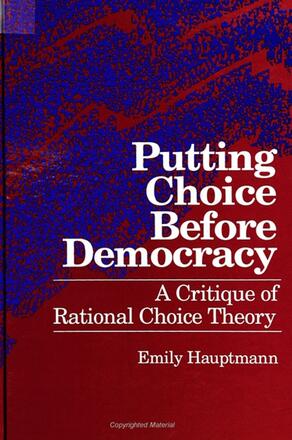
Putting Choice Before Democracy
A Critique of Rational Choice Theory
Alternative formats available from:
Shows how rational choice theory's critique and justification of democracy fails in its project to recast democratic theory.
Description
In this critique of rational choice theory, Emily Hauptmann explores the idea central to the theory, namely, that democracy can best be explained in terms of an economic conception of choice. Her argument turns on the claims that the choices we face as citizens are not reducible to the choices we face as consumers and that democracy cannot be reduced to a series of choices, economic or otherwise.
Emily Hauptmann is Assistant Professor in the Department of Political Science, University of Nevada, Reno.
Reviews
"In an original assessment of rational choice theoretic analyses of democracy, Emily Hauptmann argues that it is the flawed conception of choice found in rational choice theory that robs it of its full power and coherence. For Hauptmann, this renders it an inappropriate tool for understanding democracy and leads rational choice theorists to misstate both the value of political choice and the ways in which political processes threaten individual choice. This is an important problem, and Hauptmann's discussion of Athenian democracy will do much to encourage long-needed dialogue between classically trained political theorists and rational choice analysts. Her conclusion, that our capacity to choose is dependent on the situations in which we find ourselves and that the frustrating properties of political choice arise because it is the situation that does not permit us to choose in the first place, should provoke much discussion and an important reconsideration of the conceptualization of choice." — Kristen Renwick Monroe, University of California at Irvine
"This is a valid and valuable critique of rational choice theorists. The real heart of the book, and the author's excellent contribution, is in her discussion of the concept of choice itself, and her demonstration that rational choice theorists deploy a minimalist and largely uninterrogated version of that concept. I consider this a major contribution to contemporary democratic theory." — Philip Green, Smith College